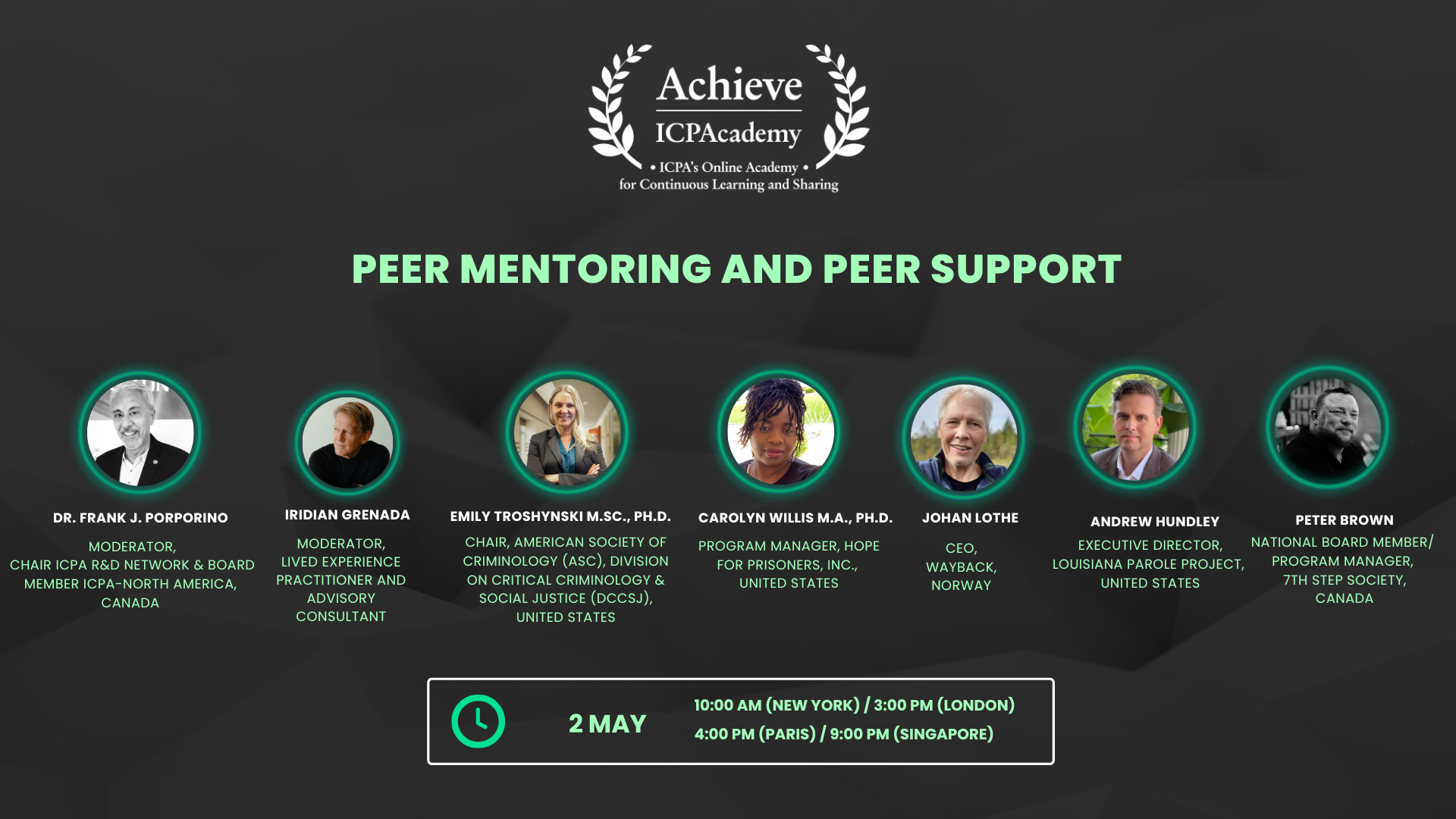Practice Transfer Focus 2025
For 2025, the practice we will be promoting is Peer Mentoring and Peer Support because we see this approach as gaining growing acceptance within correctional services around the world.
“Leveraging Experiential Knowledge in Enhancing Correctional Practice”
Correctional Services are increasingly recognizing the potential benefits of engaging both offenders and ex-offenders to serve in a peer-support capacity, as mentors, and even as case workers, addictions counselors and in various other service-delivery roles. The research indicates clearly that the support work of these individuals with ‘lived experience’ can be quite rehabilitative; it can motivate change and have lasting impact in challenging criminal identities. ICPA and our Practice Transfer Advisory Committee would therefore like to document to what extent individuals with lived experience (AKA ‘experiential knowledge’) are being acknowledged and deployed in various service-oriented capacities either in prisons or in the community around the world. We will endeavor to highlight examples of model programs, point to some of the research evidence supporting peer involvement, and try to capture the views not just of individuals with lived experience, but also practitioners and correctional managers and leaders.
For 2025, Iridian Grenada has joined the ICPA Practice Transfer Advisory Committee as a member. As a Lived Experience Practitioner and Advisory Consultant for Post-incarceration Reintegration, Grenada brings valuable firsthand insights to the Committee's work.
PTAC Survey 2025
Michigan Department of Corrections
The Michigan Department of Corrections launched its Peer Recovery Coach program in 2021, employing individuals with lived experience in substance use recovery to work in prisons and parole/probation offices. These trained professionals support both incarcerated and community-supervised individuals struggling with addiction, serving as valued members of treatment teams. The program operates at four prison facilities and 23 parole/probation offices across Michigan, funded by State Opioid Response grants. It has demonstrated measurable success in reducing violations, positive drug screens, and reincarceration rates. MDOC intentionally hires individuals with criminal records, including felony offenses, recognizing the unique value of their experiential knowledge in motivating behavioral change and providing hope for recovery.
Singapore Prison Service
In a comprehensive survey conducted by the PTAC, significant insights from the Singapore Prison Service (SPS) were gathered regarding the successful integration of individuals with lived experience in correctional services. The survey highlights innovative approaches to peer mentoring, rehabilitation programs, and community reintegration initiatives that have shown promising results in Singapore's correctional system. These findings demonstrate the valuable contribution of both desistors (former offenders living crime-free lives in the community) and peer supporters (current inmates providing mentorship) in enhancing rehabilitation outcomes. The following detailed survey outlines the various programs, challenges, and future directions of these initiatives.
General Directorate of Prisons and Detention Houses Türkiye
This comprehensive survey examines the integration of individuals with lived experience in correctional services, particularly focusing on Türkiye's rehabilitation programs. The findings highlight the crucial role of peer mentors in facilitating rehabilitation and reintegration of offenders, noting that their first-hand experience creates more effective connections than traditional service providers. The survey emphasizes how peer mentors, who have successfully rehabilitated themselves, serve as credible role models and help overcome the psychological resistance that many offenders exhibit towards professional staff.
The survey details several successful initiatives in Türkiye, including the PPROMPT (Peer Pro-Social Modeling in Probation) Program and prison-based peer support systems, particularly in addiction recovery. The PPROMPT program, developed as part of an Erasmus+ KA204 project, provides comprehensive training for peer mentors and focuses on life skills development through ten structured sessions covering topics from personal accountability to effective parenting. The program is supported by extensive documentation, including trainer guides and resource materials, ensuring standardized implementation across facilities.
Learning Academy Session: Peer Mentoring and Peer Support
Correctional Services all over the world are increasingly recognizing the potential benefits of engaging both offenders and ex-offenders to serve in a peer-support capacity, as mentors, and even as caseworkers, addictions counsellors and in various other service-delivery roles both in prisons and in the community. The research indicates clearly that the support work of these individuals with ‘lived experience’ can be quite rehabilitative; it can motivate change and have a lasting impact in challenging criminal identities.
ICPA and our Practice Transfer Advisory Committee hosted the Learning Academy Session in order to highlight how individuals with lived experience (AKA ‘experiential knowledge’) are being acknowledged and, in many instances, how they have developed innovative service-delivery models to complement and enhance the efforts of correctional services. The Learning Academy provided an overview of the research evidence supporting peer involvement in correctional practice. Several examples of model programs from the US, Canada and Norway were profiled, with the views of individuals with lived experience being front and center. In the second part of the Learning Academy, there was an opportunity for a broad range discussion on the ‘rehabilitative’ potential, and both the opportunities and challenges for more fully integrating Peer Mentoring and Peer Support within correctional practice.

